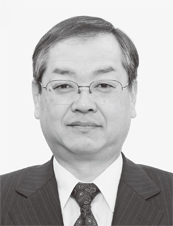No.20 March 2015 - Special Issue on “Steel Plates” and “Welding and Joining”
Foreword

KUBO Ryouji
Senior Vice President,
Director, Plate Business Planning Function,
JFE Steel
Steel plates are used as basic materials supporting the industrial/social infrastructure, including shipbuilding, construction, bridges, and energy-related equipment, among others, and as such, their importance remains unchanged. In recent years, the environment surrounding plate business has changed greatly, as steel makers in China, Korea, and Southeast Asian countries have carried out expansion and new construction of plate production facilities in the context of economic growth centering on Asia and firm energy development around the globe.
On the other hand, increasing importance is also attached to safe/secure design and economy in large-scale welded structures in which plates are used, and customers’ specification requirements and quality requirements have become stricter and more advanced, further heightening the need for high performance steel plates. In order to respond to complex, high level quality requirements, tireless material development and basic research that anticipate the needs of customers and the development of cutting-edge process technologies that form the foundation for manufacturing high quality plates are indispensable.
JFE Steel developed thermo-mechanical control process (TMCP) by independently developing manufacturing equipment, and has employed this technology to develop and market a large number of high performance plates. The company has established manufacturing process for high grade steels with the accelerated cooling devices Super-OLACTM, which is in operation at three locations, Fukuyama and Kurashiki Districts of West Japan Works and Keihin District of East Japan Works, as the basis for TMCP. Fukuyama District also started operation of the on-line heat treatment process HOPTM, and in 2011, Fukuyama District introduced an advanced version of the Super-OLACTM, called Super-OLACTM-A. The company has also realized practical application of a process, Super-CR, enabling continuous controlled rolling, which is one of the element technologies of TMCP, and started up this equipment at Keihin District in 2009. The company is continuing to expand its lineup of high product plates by making full use of these state-of-the-art production facilities.
This special issue reviews the progress of process technology at JFE Steel in recent years, and introduces new plate products which the company has developed by a fusion of TMCP, metallurgical technology, and material quality design technology.
In the shipbuilding field, JFE Steel has developed a yield strength 460 N/mm2 class steel plate with excellent arrestabillity of brittle crack propagation and a steel plate for cryogenic service which is suitable for large heat input welding, and in the energy development field, the company has developed high strength steel plates for extreme low temperature service in offshore structures. These products respond to the needs of safe and secure design, while also contributing to improved economy by enabling higher efficiency in welding and thickness reduction by application of high strength steel. The manufacturing technology and results of the application of longitudinally profiled (LP) plates, which contribute to reduction of structure weight, are also introduced. In the building construction field, JFE Steel sells the HBLTM Series of non-heat treated high strength steel plates and also completed commercialization of the tensile strength 590 N/mm2 class steel HBLTM440 in 2013. Thus, the company has created a system that makes it possible to select the optimum plate for economy in the design of high-rise buildings and their structural members for customers.
Requirements for extended life and reduction of life cycle cost in steel structures are increasing by the year. As corrosion-resistant steels that reduce corrosion of steel materials, which controls structure life, JFE Steel has completed development of corrosion-resistant steel plates for ballast tanks, “JFE-SIPTM-BT,” and corrosion-resistant steel plates for crude oil tanks, “JFE-SIPTM-OT.” Demonstration tests have also been conducted, and these products have been commercialized.
For application and practical use of these high performance plates in structures, investigation of the basic mechanism of their performance and development of use technologies are also considered important. As several examples, this issue presents papers on basic research in connection with brittle fracture and fatigue fracture, which are related to safe design, and corrosion simulation technology, which is related to extension of bridge life.
JFE Steel also has a full range of high quality products in other fields. In its lineup of abrasion-resistant steel plates, “EVERHARDTM,” for construction/industrial machinery, the company is expanding its products to meet the diverse requirements of customers. The product introduction section describes heavy thickness chromium-molybdenum steel plates for energy plants, heavy thickness yield point 690 N/mm2 class steel with low temperature toughness, and high corrosion resistance clad steel, which are manufactured by using proprietary JFE Steel processes. A high performance pre-coated steel plate “LEC,” which is a unique product that improves the laser cutting property of pre-coated steel plates, is also proposed.
In the future, JFE Steel will continue research and development of new products and new processes, and will contribute to society by supplying high quality plate products that respond to customer needs. Your further guidance and support are appreciated.
- Foreword [PDF 3P/4.79MB]
